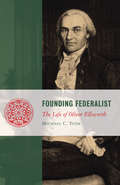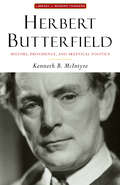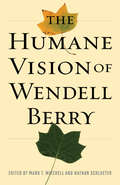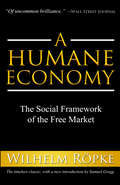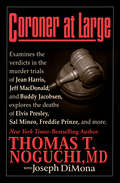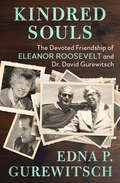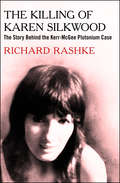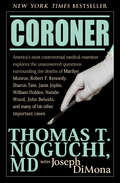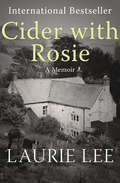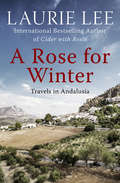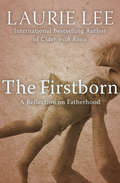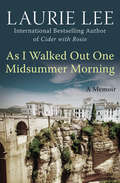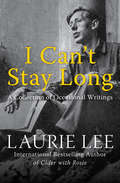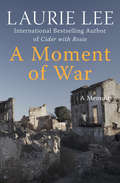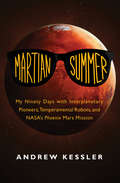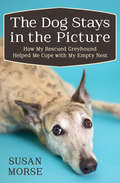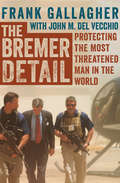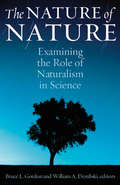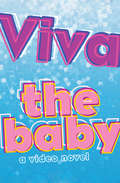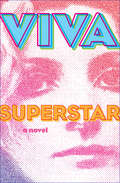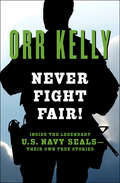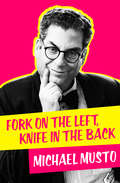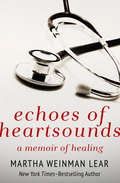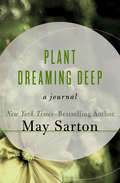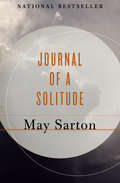- Table View
- List View
Founding Federalist: The Life of Oliver Ellsworth (Lives Of The Founders Ser.)
by Michael TothIn Founding Federalist, Michael C. Toth provides an in-depth look at the life and work of Oliver Ellsworth, a largely forgotten but eminently important Founding Father.The American Founding was the work of visionaries and revolutionaries. But amid the celebrated luminaries, the historic transformations, the heroic acts, and unforgettable discourses were practical politicians, the consensus builders who made the system work. Oliver Ellsworth--Framer, senator, chief justice, diplomat--was such a leader.Founding Federalist brings to life a figure whose contributions shape American political life even today. Vividly capturing the pivotal debates at Philadelphia in the summer of 1787, Toth shows how Ellsworth was a vital force in shaping the Constitution as a Federalist document, one that did not extinguish the role of the states even as it recognized the need for national institutions. The author illuminates what Ellsworth and other Founders understood to be the meaning of the new constitutional order--a topic highly relevant to twenty-first-century debates about the role of government. Toth, an attorney, also brilliantly analyzes Ellsworth's most important legislative achievement: the creation of the U.S. federal court system.With this insightful new biography, Michael Toth has reclaimed a figure who made crucial contributions to a lasting creation: a federal republic.
Herbert Butterfield: History, Providence, and Skeptical Politics (Library Modern Thinkers Ser.)
by Kenneth Mcintyre"The most original historian of his generation"That is how the celebrated British academic Noel Annan described Herbert Butterfield (1900-1979), a profound and prolific writer who made important contributions as both a public and academic historian.In this authoritative and accessible intellectual biography, Kenneth B. McIntyre explores the extraordinary range of Butterfield's work. He shows why the small book The Whig Interpretation of History (1931) achieved such large influence; Butterfield, he demonstrates, has profoundly shaped American and European historiography by highlighting the distortions that occur when historians interpret the past merely as steps along the way toward the glorious present.But McIntyre delves much deeper, examining everything from Butterfield's lectures on history, historiography, and Christianity, to his warnings about the dangers of hubris in international affairs, to his essays on the origins of modern science, which basically created the modern discipline of the history of science.This latest volume in ISI Books' acclaimed Library of Modern Thinkers helps us understand a prescient and insightful thinker who challenged dominant currents in history, historiography, international relations, and politics.
The Humane Vision of Wendell Berry
by Mark Mitchell Nathan SchlueterA striking contribution to the conversation that is conservatismWendell Berry—poet, novelist, essayist, critic, farmer—has won the admiration of Americans from all walks of life and from across the political spectrum. His writings treat an extraordinary range of subjects, including politics, economics, ecology, farming, work, marriage, religion, and education. But as this enlightening new book shows, such diverse writings are united by a humane vision that finds its inspiration in the great moral and literary tradition of the West.In The Humane Vision of Wendell Berry, Mark T. Mitchell and Nathan Schlueter bring together a distinguished roster of writers to critically engage Berry&’s ideas. The volume features original contributions from Rod Dreher, Anthony Esolen, Allan Carlson, Richard Gamble, Jason Peters, Anne Husted Burleigh, Patrick J. Deneen, Caleb Stegall, Luke Schlueter, Matt Bonzo, Michael Stevens, D. G. Hart, Mark Shiffman, and William Edmund Fahey, as well as a classic piece by Wallace Stegner.Together, these authors situation Berry&’s ideas within the larger context of conservative thought. His vision stands for reality in all its facets and against all reductive &“isms&”—for intellect against intellectualism, individuality against individualism, community against communitarianism, liberty against libertarianism. Wendell Berry calls his readers to live lives of gratitude, responsibility, friendship, and love—notions that, as this important new book makes clear, should be at the heart of a thoughtful and coherent conservatism.
A Humane Economy: The Social Framework of the Free Market
by Wilhelm Röpke&“A Humane Economy is like a seminar on integral freedom conducted by a professor of uncommon brilliance.&” —Wall Street Journal&“If any person in our contemporary world is entitled to a hearing it is Wilhelm Röpke.&” —New York TimesA Humane Economy offers one of the most accessible and compelling explanations of how economies operate ever written. The masterwork of the great twentieth-century economist Wilhelm Röpke, this book presents a sweeping, brilliant exposition of market mechanics and moral philosophy.Röpke cuts through the jargon and statistics that make most economic writing so obscure and confusing. Over and over, the great Swiss economist stresses one simple point: you cannot separate economic principles from human behavior.Röpke&’s observations are as relevant today as when they were first set forth a half century ago. He clearly demonstrates how those societies that have embraced free-market principles have achieved phenomenal economic success—and how those that cling to theories of economic centralization endure stagnation and persistent poverty.A Humane Economy shows how economic processes and government policies influence our behavior and choices—to the betterment or detriment of life in those vital and highly fragile human structures we call communities. &“It is the precept of ethical and humane behavior, no less than of political wisdom,&” Röpke reminds us, &“to adapt economic policy to man, not man to economic policy.&”
Coroner at Large (Coroner #2)
by Thomas T. Noguchi Joseph DiMonaTo Thomas T. Noguchi, America&’s most famous medical examiner, every death is a mystery—until the cause is found In his first book, the runaway bestseller Coroner, Dr. Noguchi wrote of his controversial investigations as medical examiner of Los Angeles County. In Coroner at Large, the man who has often been called the &“Detective of Death&” probes the mysteries surrounding the most celebrated criminal cases in recent American history. Using sophisticated techniques of modern forensic science and once again &“telling it like it is,&” Dr. Noguchi reveals the truth behind the headlines in the untimely deaths of show business celebrities: —The drowning of Beach Boy Dennis Wilson —The murder of Sal Mineo —The suicide of Freddie Prinze —The slaying of &“Playmate of the Year&” Dorothy Stratten —Elvis Presley&’s fatal heart attack Forensic science, too, provides new clues to fascinating historical puzzles: the true fates of General George Custer, the Emperor Napoleon, and Adolf Hitler. In Coroner at Large, Dr. Noguchi brilliantly provides the missing links in our knowledge of these cases. Here, from his own investigations and his pioneering work in the field, we see forensic science in action, unraveling the mysteries of death—both natural and unnatural—in real-life cases that might have baffled even the great Sherlock Holmes.
Kindred Souls: The Devoted Friendship of Eleanor Roosevelt and Dr. David Gurewitsch
by Edna P. GurewitschThe poignant and unforgettable true account of the deep, loving friendship between a handsome physician and the former First Lady"I love you as I love and have never loved anyone else." --Eleanor Roosevelt in a letter to Dr. David Gurewitsch, 1955 She was the most famous and admired woman in America. He was a strikingly handsome doctor, eighteen years her junior. Eleanor Roosevelt first met David Gurewitsch in 1944. He was making a house call to a patient when the door opened to reveal the wife of the president of the United States, who had come to help her sick friend. A year later, Gurewitsch was Mrs. Roosevelt's personal physician, on his way to becoming the great lady's dearest companion--a relationship that would endure until Mrs. Roosevelt's death in 1962. Recounting the details of this remarkable union is an intimately involved chronicler: Gurewitsch's wife, Edna. Kindred Souls is a rare love story--the tale of a friendship between two extraordinary people, based on trust, exchange of confidences, and profound interest in and respect for each other's work. With perceptiveness, compassion, admiration, and deep affection, the author recalls the final decade and a half of the former First Lady's exceptional life, from her first encounter with the man who would become Mrs. Gurewitsch's husband through the blossoming of a unique bond and platonic love. Blended into her tender reminiscences are excerpts from the enduring correspondence between Dr. Gurewitsch and the First Lady, and a collection of personal photographs of the Gurewitsch and Roosevelt families. The result is a revealing portrait of one of the twentieth century's most beloved icons in the last years of her life--a woman whom the author warmly praises as "one of the few people in this world in which greatness and modesty could coexist."
The Killing of Karen Silkwood: The Story Behind the Kerr-McGee Plutonium Case
by Richard RashkeOn November 13, 1974, Karen Silkwood was driving on a deserted Oklahoma highway when her car crashed into a cement wall and she was killed. On the seat next to her were doctored quality-control negatives showing that her employer, Kerr-McGee, was manufacturing defective fuel rods filled with plutonium. She had recently discovered that more than forty pounds of plutonium were missing from the Kerr-McGee plant. Forty years later, her death is still steeped in mystery. Did she fall asleep before the accident, or did someone force her off the road? And what happened to the missing plutonium? The Killing of Karen Silkwood meticulously lays out the facts and encourages the readers to decide. Updated with the author's chilling new introduction that discusses the similarities with Edward Snowden's recent revelations, Silkwood's story is as relevant today as it was forty years ago. For this updated edition, the author has added the latest information as to what happened to the various people involved in the Silkwood case and news of the lasting effects of this underreported piece of the history of the antinuclear movement.
Coroner: America's Most Controversial Medical Examiner Tells All (Coroner #1)
by Thomas T. Noguchi Joseph DiMonaAmerica&’s most controversial medical examiner explores the unanswered questions surrounding the deaths of Marilyn Monroe, Robert F. Kennedy, Sharon Tate, Janis Joplin, William Holden, Natalie Wood, John Belushi, and many of his other important casesNow, for the first time, Dr. Noguchi recounts his colorful and stormy career, explains his innovative techniques, and reveals the full story behind his most fascinating investigations.In Coroner, Dr. Noguchi sheds new light on his most controversial cases—controversies that persist even today:—How did Natalie Wood spend the last terrifying moments of her life?—Did Marilyn Monroe commit suicide or were the drugs that killed her injected into her body by someone else?—Did Sirhan Sirhan or another gunman fire the bullet that killed Robert Kennedy?—How could the knives used in the murder of Sharon Tate be identified and traced to the Manson gang if they were never found?—What were the real circumstances behind the drug-related death of Janis Joplin?—Were Patty Hearst&’s kidnappers victims of police brutality or of their own revolutionary zeal?—How and why did William Holden die?—Was John Belushi murdered?These are just some of the questions answered in this powerful, gutsy book written by the real-life &“Quincy,&” with co-author Joseph DiMona.
Cider with Rosie: A Memoir (The Autobiographical Trilogy #1)
by Laurie LeeThis international-bestselling memoir of childhood in post–World War I rural England is one of the most &“remarkable&” portraits of youth in all literature (The New York Times). Three years old and wrapped in a Union Jack to protect him from the sun, Laurie Lee arrived in the village of Slad in the final summer of the First World War. The cottage his mother had rented for three and sixpence a week had neither running water nor electricity, but it was surrounded by a lovely half-acre garden and, most importantly, it was big enough for the seven children in her care. It was here, in a verdant valley tucked into the rolling hills of the Cotswolds, that Laurie Lee learned to look at life with a painter&’s eye and a poet&’s heart—qualities of vision that, decades later, would make him one of England&’s most cherished authors. In this vivid recollection of a magical time and place, water falls from the scullery pump &“sparkling like liquid sky.&” Autumn is more than a season—it is a land eternally aflame, like Moses&’s burning bush. Every midnight, on a forlorn stretch of heath, a phantom carriage reenacts its final, wild ride. And, best of all, the first secret sip of cider, &“juice of those valleys and of that time,&” leads to a boy&’s first kiss, &“so dry and shy, it was like two leaves colliding in air.&” An instant classic when it was first published in 1959, Cider with Rosie is one of the most endearing and evocative portraits of youth in all of literature. The first installment in an autobiographical trilogy that includes As I Walked Out One Midsummer Morning and A Moment of War, it is also a heartfelt and lyrical ode to England, and to a way of life that may belong to the past, but will never be forgotten.
A Rose for Winter: Travels in Andalusia
by Laurie LeeA passionate ode to the magic of Spain, composed by one of its most ardent admirersFifteen years after the events described in his acclaimed autobiographies, As I Walked Out One Midsummer Morning and A Moment of War, Laurie Lee returned to Spain, the land of his youth and experience. He found a country bowed but not broken, where the heavy gloom of the recent past was shot through with the vibrant rays of tradition: the exquisite ecstasy of the flamenco, the pomp and circumstance of the bullfight, the eternal glory of Christ and church.From the smuggler&’s paradise of Algeciras to the Moorish majesty of Granada, Lee paints the wonders of Spain with a poet&’s brush. To read A Rose for Winter is to be transported to one of the most enchanted places on earth.
The Firstborn: A Reflection on Fatherhood
by Laurie LeeAn intimate and lyrical consideration of what it means to be a fatherThis moment of meeting seemed to be a birth-time for both of us; her first and my second life. Nothing, I knew, would be the same again . . .Full of warmth and candor, this essay composed on the occasion of his daughter&’s birth is one of Laurie Lee&’s most delightful and inspiring works. From the moment Jessy is born, &“purple and dented like a bruised plum,&” to the first time his kiss quiets her cries, Lee describes the joys and responsibilities of new fatherhood with a poet&’s precision and boundless capacity for wonder.
As I Walked Out One Midsummer Morning: A Memoir (The Autobiographical Trilogy #2)
by Laurie LeeThe author of Cider with Rosie continues his bestselling autobiographical trilogy with &“a wondrous adventure&” through Spain on the eve of its civil war (Library Journal). On a bright Sunday morning in June 1934, Laurie Lee left the village home so lovingly portrayed in his bestselling memoir, Cider with Rosie. His plan was to walk the hundred miles from Slad to London, with a detour of an extra hundred miles to see the sea for the first time. He was nineteen years old and brought with him only what he could carry on his back: a tent, a change of clothes, his violin, a tin of biscuits, and some cheese. He spent the first night in a ditch, wide awake and soaking wet. From those unlikely beginnings, Laurie Lee fashioned not just the adventure of a lifetime, but one of the finest travel narratives of the twentieth century. As I Walked Out One Midsummer Morning, written more than thirty years after the events it describes, is an elegant and irresistibly charming portrait of life on the road—first in England, where the familiar landscapes and people somehow made Lee feel far from home, and then in Spain, whose utter foreignness afforded a new kind of comfort. In that brief period of peace, a young man was free to go wherever he wanted to in Europe. Lee picked Spain because he knew enough Spanish to ask for a glass of water. What he did not know, and what would become clear only after a year spent tramping across the beautiful and rugged countryside—from the Galician port city of Vigo, over the Sierra de Guadarrama and into Madrid, and along the Costa del Sol—was that the Spanish Republic would soon need idealistic young men like Lee as badly as he needed it.
I Can't Stay Long (Penguin Modern Classics Ser.)
by Laurie LeeThe essential Laurie Lee, a collection of occasional writings full of his unique vision and irresistible charm All of the wit and wisdom and poetry that made Laurie Lee one of the most celebrated English writers of the twentieth century can be found in this compilation of &“first loves and obsessions.&” In Part One, Lee revisits his idyllic boyhood in the Cotswolds village made famous by his bestselling autobiography, Cider with Rosie. In Part Two, he turns his attention to an earnest consideration of abstract concepts such as the power of charm, the pleasures of appetite, and the meaning of paradise. And in the final and longest section, the author of the acclaimed Spanish travelogues As I Walked Out One Midsummer Morning and A Rose for Winter tells the stories of his many other journeys—from sun-dappled Tuscany to melancholy Warsaw to the enchanting and exotic Sugar Islands of the Caribbean.
A Moment of War: A Memoir (The Autobiographical Trilogy #3)
by Laurie LeeA memoir of the Spanish Civil War with &“the plainness of Orwell but the metaphorical soaring of a poem . . . An extraordinary book&” (The New York Times Book Review).In December 1937 I crossed the Pyrenees from France—two days on foot through the snow. I don&’t know why I chose December; it was just one of a number of idiocies I committed at the time. Such was Laurie Lee&’s entry into the Spanish Civil War. Six months after the Nationalist uprising forced him to leave the country he had grown to love, he returned to offer his life for the Republican cause. It seemed as simple as knocking on a farmhouse door in the middle of the night and declaring himself ready to fight. It would not be the last time he was almost executed for being a spy. In that bitter winter in a divided Spain, Lee&’s youthful idealism came face to face with the reality of war. The International Brigade he sought to join was not a gallant fighting force, but a collection of misfits without proper leadership or purpose. Boredom and bad food and false alarms were as much a part of the experience of war as actual battle. And when the decisive moment finally came—the moment of him or the enemy—it left Lee feeling the very opposite of heroic. The final volume in Laurie Lee&’s acclaimed autobiographical trilogy—preceded by Cider with Rosie and As I Walked Out One Midsummer Morning—is a clear-eyed and vital snapshot of a young man, and a proud nation, at a historic crossroads.
Martian Summer: My Ninety Days with Interplanetary Pioneers, Temperamental Robots, and NASA's Phoenix Mars Mission
by Andrew KesslerA space enthusiast goes inside mission control with a motley crew of rocket scientists in this &“fascinating journey of discovery peppered with humor&” (Publishers Weekly). The Phoenix Mars mission was the first man-made probe ever sent to the Martian arctic. Its purpose was to find out how climate change could turn a warm, wet planet (read: Earth) into a cold, barren desert (read: Mars). Along the way, Phoenix discovered a giant frozen ocean trapped beneath the north pole of Mars, exotic food for aliens, and liquid water, and laid the foundation for NASA&’s current exploration of Mars using the Curiosity rover. This is not science fiction. It&’s fact. And for the luckiest fanboy in fandom, it was the best vacation ever. Andrew Kessler spent the summer of 2008 in NASA&’s mission control with one hundred thirty of the world&’s best planetary scientists and engineers as they carried out this ambitious operation. He came back with a story of human drama about modern-day pioneers battling NASA politics, temperamental robots, and the bizarre world of daily life in mission control.
The Dog Stays in the Picture: How My Rescued Greyhound Helped Me Cope with My Empty Nest
by Susan MorseThis is not a book about a dog. I really do prefer my husband—honest. But it&’s hard to tell the story of our journey into the empty nest, and leave out one particular animal. Which kind of illustrates the problem. It is November 2009, and after mourning the loss of Arrow, their beloved Australian shepherd mutt, Susan and David Morse and family are finally ready to adopt a new dog. David&’s acting jobs keep him away from home for long stretches of time, the last two teenagers are on their way to college, and this time it&’s Susan&’s turn to pick the dog. She probably should have thought a little more carefully before falling for a retired racing greyhound. Enter Lilly, who lands like a disoriented neutron bomb in Susan&’s comfortable suburban home after living the first three years of her life in the rugged and ruthless world of the racetrack. Instantly lovable but hopelessly inept at domesticity, Lilly turns out to be more than Susan bargained for, throwing all Susan and David&’s plans for their long-anticipated, footloose empty-nest years into complete disarray. In The Dog Stays in the Picture, Susan Morse tells the hilarious and moving story of how an anxious dog and a high-strung woman find tranquility together.
The Bremer Detail: Protecting the Most Threatened Man in the World
by John M. Del Vecchio Frank GallagherBaghdad, 2003: An elite group of private security contractors is charged with protecting the American who rules Iraq In May 2003 President George W. Bush appointed Paul Bremer as presidential envoy to Iraq. Bremer banned the Ba'ath party and dismantled the Iraqi army, which made him the prime target for dozens of insurgent and terrorist groups. Assigned to protect him during his grueling sixteen-hour days were Blackwater security expert Frank Gallagher and a team of former Marines, SEALs, and other defense professionals. When they arrived, Baghdad was set to explode. As the insurgency gathered strength Bremer and the men who guarded him faced death daily. They were not in the military, but Gallagher and his team were on the front lines of the Iraq War. This fascinating memoir takes the reader deep behind the scenes of a highly dangerous profession.This ebook includes ten pages of action photos from the author's time in Baghdad.
The Nature of Nature: Examining the Role of Naturalism in Science
by William Dembski Bruce GordonThe intellectual and cultural battles now raging over theism and atheism, conservatism and secular progressivism, dualism and monism, realism and antirealism, and transcendent reality versus material reality extend even into the scientific disciplines. This stunning new volume captures this titanic clash of worldviews among those who have thought most deeply about the nature of science and of the universe itself.Unmatched in its breadth and scope, The Nature of Nature brings together some of the most influential scientists, scholars, and public intellectuals--including three Nobel laureates--across a wide spectrum of disciplines and schools of thought. Here they grapple with a perennial question that has been made all the more pressing by recent advances in the natural sciences: Is the fundamental explanatory principle of the universe, life, and self-conscious awareness to be found in inanimate matter or immaterial mind? The answers found in this book have profound implications for what it means to do science, what it means to be human, and what the future holds for all of us.
The Baby: A Video Novel
by VivaA former superstar of Andy Warhol&’s Factory offers an intimate tale of sex, drugs, art, and motherhood, based on video recordingsThe Baby is not your average parenthood novel. Viva, a.k.a. Viva Superstar—actor, writer, painter, denizen of Andy Warhol&’s world-famous Factory, and early pioneer in video arts—weaves a tale of childbirth and motherhood with often-shocking candor, exploring a new mother&’s mixed emotions and her internal and external conflicts. Based on filmed records created by Viva&’s husband, Michael Auder, of their daughter&’s difficult birth and early development, and interspersed with stills from their life, Viva&’s addictive video novel tells the story of a fictional couple, Augustine and Frederick Marat, whose unorthodox parenting takes them from New York to Paris to Casablanca to California. In her own unique style, Viva explores breast-feeding and breast pumps, infidelity and incest while offering startlingly intimate details of a family&’s singular lifestyle. An unabashedly autobiographical literary invention, alternately outrageous and honest, revelatory and touching, The Baby is truly one of a kind.
Superstar: A Novel
by VivaA bold and uncensored fictional account of the wild life at Andy Warhol&’s world-famous Factory by a real-life superstar who witnessed it all Author, video artist, underground film actor, and superstar, the incomparable Viva is arguably the most famous of Andy Warhol&’s protégés, a mainstay at the enigmatic artist&’s Factory. In her riveting, revelatory, totally uncensored, and scandalously entertaining novel, the Factory doors are blown wide open, exposing a world of sex, drugs, and genius. Based on Viva&’s own life, Superstar is the story of Gloria, a repressed, convent-educated aspiring artist who escapes the strictures of her stifling existence and flees to New York City. Falling in with an iconic artist referred to as A. and his coterie of outrageous, beautiful avant-garde acolytes, transvestites, boy toys, and hangers-on, Gloria is reborn, undergoing a remarkable transformation from sheltered young innocent to sexual athlete, film star, and media darling. Over the course of her reawakening, she sheds her every inhibition as she experiences what ordinary people only dream about in their most secret fantasies . . . or worst nightmares. Though the names have all been changed, the real stars of Warhol&’s factory are scandalously recognizable. Viva injects her own unique style and personality into a story at once outrageous and brutally honest: the unforgettable making of a superstar.
Never Fight Fair!: Inside the Legendary U.S. Navy SEALs—Their Own True Stories
by Orr KellyA riveting oral history of the US Navy SEALs—from World War II to Vietnam to Iraq—in the words of the warriors themselves&“It is better to die than to look bad or lose.&” —Capt. Ronald YeawThere is no more elite fighting force in the world than the esteemed US Navy SEALs. Famous for their rigorous training, fearlessness, and incomparable skills on sea, air, and land, these are the warriors who are routinely charged with carrying out the most dangerous combat assignments, always in secret and under cover of darkness. Much has been written about their remarkable achievements, from the earliest days of the World War II Underwater Demolition Teams through action in the Persian Gulf. But now these courageous men get to speak for themselves, telling their riveting war stories in their own words.Veteran military author Orr Kelly (Brave Men, Dark Water) has gathered together the stunning recollections of current and former SEALs to present a vivid and breathtaking picture of life and death among the best of the best in US Military Special Operations. These brave men speak openly about their training and their missions, offering the uncensored, inspiring, sometimes shocking truth about their combat triumphs and the rare but devastating failures. They carry the reader along with them on the path to glory and into the blistering heat of the fires of war.
Fork on the Left, Knife in the Back
by Michael MustoFor over a quarter of a century, Michael Musto entertained the country with his column &“La Dolce Musto&” in the Village Voice; fabulous, funny, and flippant, this collection is an insider&’s guide to the glittering highs and desperate lows of New York City&’s more colorful residentsHailed by the New York Times as &“the city&’s most punny, raunchy, and self-referential gossip columnist,&” Michael Musto doled out wit and wisdom in his weekly Village Voice column for twenty-nine years. This waggish and wise book contains highlights from his published pieces as well as several original essays.With his trademark slashing humor, Musto weighs in on everything from celebrities in need of counseling to cheap thrill–seeking and why weirdos are his heroes. No one is spared, including the self-proclaimed &“King of Gossip&” himself. His interviews and profiles of Paris Hilton, Sandra Bernhard, Crispin Glover, Kiki and Herb, Sarah Silverman, and other fringe celebrities are priceless, made all the more vivid by Musto&’s extraordinary access. Catty, titillating, and endlessly enthralling, Fork on the Left, Knife in the Back is a feast for the senses—a must-have book for Musto devotees and fans of popular culture.This ebook features an introduction by the author.
Echoes of Heartsounds: A Memoir of Healing
by Martha Weinman LearThis New York Times–bestselling author&’s memoir of her own heart attack is &“a refresher course in handling life&’s meanest challenges with grace&” (Library Journal). It begins late one afternoon in her kitchen. There is no collapse, no massive pain. Just a slight fluttering sensation in her chest, then chills, and finally, nausea. Probably nothing to worry about, the doctor assures her on the phone. It doesn&’t sound like a heart attack. But it is. Heart attacks in women can look and feel dramatically different than they do in men, which is why they often go undiagnosed. But heart disease is the number-one killer of American women—greater than all forms of cancer combined. When the doctor examines Lear the day after her episode, the verdict is shocking. So begins an account, filled with grace, humor, and ferocity, of her hard-won return to good health, beset by mysterious postsurgical complications and haunted by memories of her late husband when she finds herself in the same coronary unit in which she lost him all those years ago.
Plant Dreaming Deep: A Journal
by May SartonThe author&’s tribute to the 18th-century New England farmhouse she called home: &“[A] tender and often poignant book by a woman of many insights&” (The New York Times Book Review). In Plant Dreaming Deep, Sarton shares an intensely personal account of transforming a house into a home. She begins with an introduction to the enchanting village of Nelson, where she first meets her house. Sarton finds she must &“dream the house alive&” inside herself before taking the major step of signing the deed. She paints the walls white in order to catch the light and searches for the precise shade of yellow for the kitchen floor. She discovers peace and beauty in solitude, whether she is toiling in the garden or writing at her desk. This is a loving, beautifully crafted memoir illuminated by themes of friendship, love, nature, and the struggles of the creative life. This ebook features an extended biography of May Sarton.
Journal of a Solitude: Journal Of A Solitude, Plant Dreaming Deep, And Recovering
by May SartonThe poet and author&’s &“beautiful . . . wise and warm&” journal of time spent in her New Hampshire home alone with her garden, her books, the seasons, and herself (Eugenia Thornton, Cleveland Plain Dealer). &“Loneliness is the poverty of self; solitude is richness of self.&” —May Sarton May Sarton&’s parrot chatters away as Sarton looks out the window at the rain and contemplates returning to her &“real&” life—not friends, not even love, but writing. In her bravest and most revealing memoir, Sarton casts her keenly observant eye on both the interior and exterior worlds. She shares insights about everyday life in the quiet New Hampshire village of Nelson, the desire for friends, and need for solitude—both an exhilarating and terrifying state. She likens writing to &“cracking open the inner world again,&” which sometimes plunges her into depression. She confesses her fears, her disappointments, her unresolved angers. Sarton&’s garden is her great, abiding joy, sustaining her through seasons of psychic and emotional pain.Journal of a Solitude is a moving and profound meditation on creativity, oneness with nature, and the courage it takes to be alone. Both uplifting and cathartic, it sweeps us along on Sarton&’s pilgrimage inward.This ebook features an extended biography of May Sarton.
